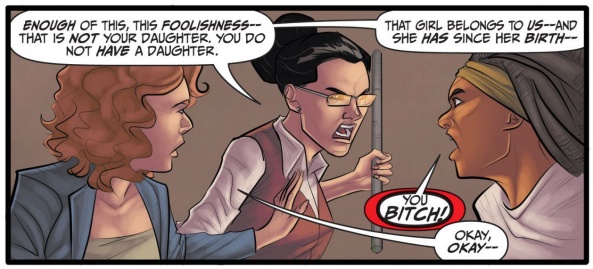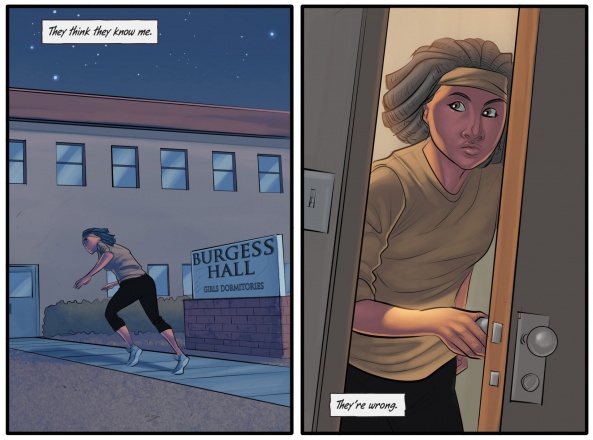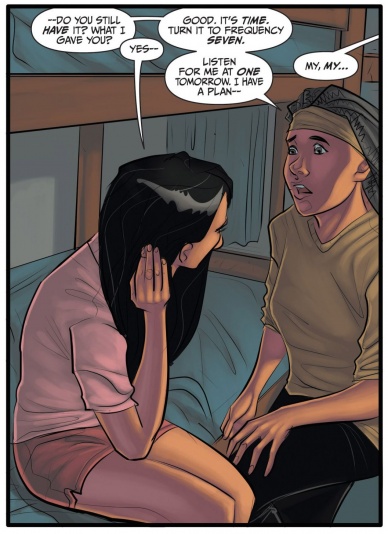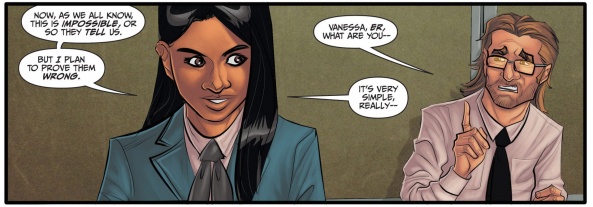

Hello and welcome back to MGA Study Hall, where all things Morning Glories are analyzed, dissected and poured over with the hope that we can figure out just what is going on!
Today’s issue is issue #44, in which we talk about the Simons, the Richmonds, and make up for lost time.
Join me as I discuss the issue, its story and the possible hidden secrets that we may or may not be picking up on. I should note: this column contains massive spoilers for the issue. Enormous. Colossal, even. The issue is out today, so make sure to read it first before you read our thoughts. It helps to give the issue a few read throughs before coming to us, but consider this your warning about impending spoilers.
As always, our very lovely/supremely awesome column header was designed by the graphic designer for the actual book, Tim Daniel! For more of Tim’s work, please visit his site Hidden Robot and be sure to check out Tim’s books “Burning Fields” and “Skinned“!
One more thing before we begin, as I’d like to continue to throw out this short plug:

For more details, click the image above. As for myself, I’ve got theorizing to do. Let’s kick it off.
A Quick Update
So, hi! Welcome back. We missed the release date on this one, and that’s my fault. There was some down time in my life, (insert more reasons and explanations here), so apologies. Because of this, some of the above and below information seems a little dated, particularly that of the missed chat, and I would imagine that most of you have already theorized this issue to heck and back without me. That’s to be expected.
Still: I thought it would be nice to get back on schedule, and with a new issue out next week it seemed like a bad idea to leave one issue forever unexplored in full. So today I’ll be making up for lost time by covering #44, and then next week there will be a brand new MGA Study Hall for #45 to coincide with the release of the issue, where the column will continue to a) be released on time and b) be release on Multiversity Comics. I hope that works for everyone, yes?
Plus, next week’s issue has, like, a whole lot of stuff we’re going to want to talk about. We better catch up.
A Wrinkle in Time

In the last issue Oliver Simon told Ellen Richmond, “There is such a thing as a tesseract.” While I didn’t pick up on it, the opening of this issue makes it clear: this is a direct reference to Madeleine L’Engle’s classic Young Adult novel A Wrinkle in Time, in which a young girl goes on an adventure using a device called a tesseract. The tesseract “wrinkles time” as kind of a “beginner’s” version of standard wormhole theory, and her and her companions use it to travel through fifth-dimensional space (although a tesseract itself is a four-dimensional shape) in a variety of ways — something that’s emphasized by Ms. Clarkson also quoting Wrinkle with “a straight line is not the shortest distance between two points” after Li’l Vanessa gets tucked into bed (which is technically mathematically false and only applicable via the previously stated wormhole theory, though likely said as a sign for Richmond to trust her).
Continued belowLast issue’s reference was a bit clever, but this issue’s reference is more on the nose given the opening and closing moments of the issue. Time travel has long been a curious element of the series, as this book has largely featured actual science while still using various tropes in science fiction for its narrative. However, the reference to Wrinkle both here and last issue may offer a more clear explanation to how people are able to travel through time – that, combined with our past understandings of how it comes together with shrines, streaks of light, and death.
How It Ends

A small line of dialogue that seems almost inconsequential is Vanessa’s comment about wanting to hear the same story over and over even though she already knows how it ends. To this Ellen replies, “just because it always ended that way before, that means it always will?”
It’s an interesting little line. As a story, things remain concrete and in stone; I may pick up on different aspects of the issue the more I read it, but it will always inevitably reach the same end point — it’s only my understanding that changes. Is this enough to make the story “different” then, or even to change the ending? Because the ending remains the same; it’s my perception that has changed.
I don’t quite think that’s what Ellen means, though. See, we know that the inclusion of time travel in this series means that the book is potentially at the peril of the “butterfly effect”, ie the theory from Bradbury’s famous A Sound of Thunder, in which one small action in the past has a huge effect on the future — and we have both seen and discussed Vanessa’s connections with butterflies back in #32 (though I avoided discussion of that theory at the time). We understood time in the book to be somewhat of an infinite loop due to mentions of things like samsara (#31), yet the main explanation we’ve had of time travel (#22) seemed to nod that the cycle could be broken.
So perhaps there’s something there. Perhaps certain elements of the cycle always remain, but there are people who can break the cycle and change it just enough to be different… and yet ultimately end in the same places. This could be inversions of good and evil, power dynamics, roles of certain character archetypes; the battle remains, but the field that war is waged upon changes from generation to generation. That’s why the Academy can exist as a monastery in the past, a school in the present, and a pile of rubble in the future — yet people are still ultimately working towards the same end goal.
Just some food for thought. Wanted to make the return of this column worth it, after all, and what better way than to overanalyze a line of dialogue in the second panel of the issue, right?
Ellen’s mention of “always end on a cliff-hanger” also seems like a nod to the format of the series, as we do in fact end every issue with a cliff-hanger. Though, that is a fairly standard storytelling trope overall.
You Know What? Let’s Have a Quick Sidebar
This is somewhat “Morning Glories” related, though not directly. I just figure, as long as we’re all here and talking about time travel, I’d like to make mention of something.
If you could all do me a favor and see a film called Predestination if you haven’t already, that’d be great. Don’t read about up on it, don’t watch the trailer, etc — just go rent it or acquire it however you can, sit down, give it a watch and a think, and keep that film in mind so I can make reference to it later.
Where’s Ian?

Okay, okay, real quick before we break out of the opening sequence, but there’s one more thing I wanted to touch upon: the relationship that exists between Li’l Vanessa and Li’l Ian.
Ian’s childhood was kind of weird, as we saw in #36. Some kind of science experiment that involves many variant copies of the same child, we know that Oliver has done something to Ian and that Ellen is at least complicit in this, if not directly involved. It’s even possible that Ian himself is not human, which is something we try not to think on too much (because I don’t want to have to theorize why an android would grow up). But what’s important to remember is that when we saw Ian, he was isolated — ie, no contact with anyone other than himself (himselves?). So if Ian is some kind of quarantine, why does Vanessa know him?
Continued belowWe know for a fact that the opening of this issue takes place after what we saw in #36 (as Clarkson makes reference to it). And we know that that’s not the end of Ian’s life, trapped in a room with himself; after all, we do know that Ian gets “let out” at some point, as he is a student at Abraham’s camp. But given that Vanessa spent time with him before whatever Oliver did to him in order to cause him to duplicate, it’s possible that similar things happened to Vanessa as well. After all, Ellen’s explanation for Ian is that he was “special” and needed to be with other kids like him (oh, I get it!), and Vanessa was special in a different way. We know Vanessa has certain abilities, so that’s not in question, but we can perhaps muse on how long abilities lay dormant in this scenario, and that perhaps Oliver was willing to “activate” his son’s talents (again assuming Ian is a Real Boy) and Ellen was not. After all, she ostensibly lies to Clarkson by saying that Vanessa is of “no real use,” when Vanessa was one of the first characters we met in the series during her escape with Brendan in the opening pages of #1.
But all of this leads us to a much bigger element of the issue, which is…
Not Your Daughter

One of the more central elements to this issue is the relationship between Ellen and Vanessa, starting at the first page when we see them ten years ago and learn that Ellen is raising her child differently than Oliver is raising his. But one recurring statement that comes up here is that Vanessa is “not” Ellen’s daughter, though Ellen adamantly denies this – and the fact that this comes up twice warrants some thought on the matter; Daramount even remarks that Vanessa has “belonged to us since birth,” which is a noteworthy statement to make given what we’ve seen in this series.
We know that the kids are in the school for a reason, and we have seen at least one birth (#20). Yet as this issue reinforces, we have seen that kids are separated from their parents and kept apart either through violence (final page of #1), strange plays of deceit (Jade’s call in #1) or murder both accidental (#9) and on purpose (#43 – and keep in mind the school has claimed “ownership” of children on a few occasions now). And despite her best efforts, the school keeps Ellen forcefully away from Vanessa, not allowing any interaction beyond their initial reunion (as we learn about in Vanessa’s letter) – though there is apparently no issue with Oliver and Ian Simon interacting frequently.
Perhaps this relates to the “nature vs. nurture” elements of their upbringing that Clarkson mentions in the opening scene. That certainly does seem to sum up the dichotomy of Ellen and Oliver’s different parenting styles — and as scientists, seeing this as an opportunity for experimentation is rather on point for whatever larger machinations are going on in the background. If the school itself is training the kids for something, then it stands to reason that they want students to come to the Academy in the best possible state for whatever is to come, and that’s why children go through ceremonies (#43) and other various trials, like Casey going back in time to grow up and become her own teacher (#26) while an agent of the Academy equally pushes and torments her (#39). So in this scenario, Oliver is doing parenting the shitty way and Ellen is doing it the right way: by showering her daughter with love and affection.

But then again… what if Vanessa isn’t Ellen’s daughter? We’ve theorized that Ian and his multitudes relates to Ian not exactly being human (if only because we saw Oliver messing around with a woman that seemed like a programable humanoid of some kind), but what if Vanessa is in a similar boat? After all, keep in mind Oliver’s really weird reaction to Vanessa later in the issue; on the surface it seems like he’s just a pervy older guy, but when he remarks about how she’s grown there could be more to his statement there.
Continued belowWe know that Ellen has an affection for Vanessa, but that doesn’t implicitly mean that Vanessa is her daughter — something worth considering because it’s repeated. Clarkson makes the remark of “treat the other like she was your own”, so the question comes up: which of them is right? Clarkson seems in the know for pretty much everything, so would you believe that she wouldn’t know who Vanessa really is? Or is it Ellen that grew too attached to something that wasn’t hers?
(Which, I should state for the record: I’m not knocking on the idea that Ellen is not Vanessa’s mother now. If Vanessa is adopted, Ellen is still her mother. But in this series, biological relationships do matter, love and bonds not withstanding.)
Whatever the case may be, it’s ultimately clear is that for some reason, Vanessa’s growth would be impeded by Ellen’s involvement, and they’ll use both sugar (Lara’s speech) and spice (Georgina’s taser) to keep them apart – whatever works.
Abraham’s Camp

A lot of the times in “Morning Glories” it seems that Nick is hesitant to name specific places or things. Part of is practical; when you make reference to certain things you could potentially date the series, which can be an issue since the book takes place “now.” But the other part is for mystery; the less the reader knows and has to figure out (by visiting this column, for example), the better.
This issue brings confirmation that Abraham’s camp is in Egypt, which is great because previously we had to refer to it as “that desert place.” But what’s interesting about this is that more and more we’re seeing a lot of references to Arabic locations: we saw the Tower of Babel in #22 which is theoretically in Iraq, which we also know Casey’s dad was stationed at in the past (#16); the last we saw of Abraham he was in Morocco in #38. While the book utilizes a rich tapestry of influences, it seems like outside the origins of the students the main plays are happening in a lot of non-United States areas. We’ll have to keep an eye on future referenced locations coming up.
We also finally get some insight into the early days of Abraham’s camp, and now more than ever we get to confirm that it was supposed to be a school to rival that of Morning Glory Academy. What’s interesting to note, though, is that that scene takes place ten years in the past, whereas Morning Glory Academy was founded fourteen years ago — and given that we know Abraham was deeply involved with them at an upper level (at least at the Wow-Mo! phase), it once again reinforces the mystery as to why Abraham left them at all. Though, if we’re going to get hyper-technical about it, it is worth noting that Abraham still had some contact with the school after that, as six years ago he abandoned Ike at Coney Island at the behest of Dagney (#24); perhaps there was some civility there, or at least hyper-secrecy in regards to Abraham’s camp.
Initiative Comes to Thems That Wait

Backing up a bit and speaking again of things being referred to, the girls dormitories are apparently named Burgess Hall, which we see as Ellen sneaks in at night to visit Vanessa. I’m going to assume this is in reference to the famous author Anthony Burgess, who has written at least one novel worth considering in discussion of the book.
The first is “A Clockwork Orange,” which many of you are likely familiar with due to the Kubrick film (though I can’t emphasize how underrated the actual novel is, if you can stomach your way through the difficulties of re-learning language). “A Clockwork Orange” is fairly obviously relevant to “Morning Glories” in that it stars a young deviant named Alex, an ardent trouble maker, who is arrested and put through what is referred to as “aversion therapy” in order to remove his violent urges. This in turn breaks down Alex and leaves him as somewhat of a shell, and the book is a meditation on how we grow up from our teenage years into adulthood, and what taking on the tasks and roles of adults does to a minor. I… don’t think I need to show why this correlates to “Morning Glories” in terms of metaphors, right?
Continued belowFor the record, Burgess has written quite a few books that we could look at in relationship with the series. Burgess himself was fascinated by religion and wrote serveral books meditating on religious themes, such as “Earthly Powers” in which the future is destroyed due to religion and the writer of the book essentially writes his autobiography following the downfall of mankind through 82 chapters (with the author himself being 81). But “A Clockwork Orange” and its relationship to young adulthood and free will and science fiction in general seems the likely bet here.
And, By the Way
This is essentially just an aside, but it is worth noting that Vanessa does not have much luck when it comes to people waking up other people in the middle of the night, as Ellen does to her. After all, the last time we saw Vanessa wake someone up (young Lara), she got brained with a rock and marooned in the past, forced to grow old in a cell.
Hey, weren’t we talking about cycles and small deviations earlier? Huh.
Richmond’s Radio

Back in #26 when we first learned about Clarkson, we saw a sequence in which she handed a radio to Ellen. We didn’t know too much about it, though it made an appearance in #21 when we saw Vanessa packing to head to the Academy. And now we know: it’s some kind of military prototype long-distance two-way radio communicator, a gift from Clarkson that she cast obliviate on.
But… here’s the thing. We’ll be jumping ahead around a bit, but take the order of events of this issue into consideration: in the present when Ellen sneaks into her daughter’s room, she asks if Vanessa still has it, to which Vanessa replies “yes” — yet we also know by issue’s end that she doesn’t; the Older Vanessa has it. So why is Ellen asking about it here, and why does Vanessa claim to have something we know she does not? Not only that, but there is no second communicator. There is only one (that we know of, anyway); so when Ellen first has the radio, who does she expect to be talking to (Clarkson says “no one” has the other radio)?
If I had to guess, I would assume that this is one of two options:
- There is no second radio. There is only this singular radio, and its use of operation is limited to its ownership by various Richmonds through time, able to talk to each other thanks to wibbly wobbly timey wimey goodness.
- There is a second radio. Vanessa did not forget to pack her radio, and Ellen was gifted the second one in secret, most likely to similar wibbly wobbly timey wimey goodness. If we want to get weird and nitpicky about visual details, Clarkson’s radio has an orange screen and Ellen’s radio at the end has a greener one — but that likely means nothing.
I’m not sure which is the correct answer yet, but I imagine we’ll learn soon. That said, it’s possible to infer which one is correct seeing as Clarkson is the one who gives the radio to Ellen, Clarkson is an agent of Hodge, and Ellen makes a deal with Hodge in the present to speak with her daughter.

It’s worth noting, by the way, that Ellen tells Vanessa to tune the radio to the frequency of seven. For those unaware, “seven” is traditionally the number of God, or at least the divine; scripture is abundant with the number seven, all of which point in God’s general direction. As such, Ellen’s mention of using that frequency is very likely related, given all of the religious overtones of the series.
So, what does a radio matter, beyond just allowing Vanessa and Ellen to stay in touch? Let’s ask Vanessa.
The Outside World

Contacting the outside world is difficult. If a child calls their parents, the parents claim to have never heard of them; if a child tries to escape, they likely find themselves lost on a confusing campus. While we know that exiting and entering the school is somewhat possible (#12/16, #36), we know that the school remains relatively cut-off from everything – and Vanessa apparently has ideas about this.
Continued belowAccording to Vanessa, there is some kind of unbreachable electromagnetic interference around the Academy. We don’t know specifically what this is, though we’ve theorized; the Academy could exist in another plane of existence, it could exist in an underground facility, it could exist in a foreign country with bad cell reception, and it could exist in a timeless bubble of some kind. Whatever the case may be, however, Vanessa claims that this is “actually quite porous” and can be breached to “successfully transmit information, or sound.” In this I’m reminded of the Island in LOST, which constantly moved itself in order to keep the powers that be on its land unable to accept, yet a specific course allowed exit and entry. Given the specific use of numbers in both series, we might expect to see Vanessa using a frequency of 813 in her project.
So for the upcoming science fare, while Ian attempts to harness the power of the Cylinder, Vanessa is going to attempt to break through the barrier. After all, as readers we know that contact with the outside world is possible; Hodge is the only one we’ve seen move freely in and out of the school, but Irina was able to contact Hunter while he slept in the hospital (#19) via meditation (#25), though she did it by appearing on a dream-TV, so there may be some fudging of explanation there. But Vanessa seems to already have some ideas of what to do in this situation, and I’m honestly not sure if it’s because of the radio or not.
As we learn, Vanessa apparently forgot to pack the radio. It makes the earlier dialogue kind of weird (as discussed), but we have to assume that Vanessa doesn’t really know about the radio’s properties (as readers, we technically don’t either). Yet, we also find out that the older version of Vanessa (the one who survived her braining in #20, revealed in #32) has the radio and can use it to talk to her mother — potentially through time (though I realize this isn’t definitively proven one way or the other, just heavily implied by previously discussed dialogue) and likely through great space. This puts into question whether Vanessa’s experiment was a success or a failure, because while contact with the outside world was apparently established, it was done so with a very specific catch, and it’s one that we don’t fully understand yet (keep in mind, the older Vanessa has been down in the basement for between 14 and 18 years; it’s a bit difficult to say for sure, using #20 as our reference).
So… is it possible that Vanessa builds the radio(s), that the school confiscates it, Hodge sends it back in time with Clarkson, and Clarkson gives it to Ellen? It’d certainly make for quite a loop of time, and hey, it’s “Morning Glories!” Anything’s possible.
We Just Want To Talk

Last, but certainly not least, one thing that’s nice about this issue is the amount of past moments it refers to, giving us a fair deal of answers on previously curious elements or story beats — a lot of which we’ve already discussed. For example, Simon’s Wrinkle comment last issue now has a bigger meaning, and there are the aforementioned nods to Richmond’s radio we just discussed, which both helps clarify elements of the timeline and adds closure to what those sequences were about. We also first saw Ellen watching her daughter in #39 and writing to her in #42.
But the bigger moment here is the reveal of the “her” from issue #33, which turns out to be Ellen. We saw Lara talk to Hisao in a now-empty Wow-Mo! office but had no idea who they were talking about; yet now Ellen and Simon being brought into the school (#36) makes more sense, because apparently Hisao gave her up to get into the Academy.
So what did the school want to talk about? And what did they offer to make her come to the Academy? One could assume it’s related to Vanessa, but given that the school keeps them apart, that seems dodgy. Perhaps it’s related to the tests she and Oliver did to Vanessa and Ian, as Vanessa remarks quite a few times her role as a scientist (even attempting to grill on Clarkson on her abilities, which Clarkson doesn’t think is a good idea. I’d wager that the school is attempting to understand the students as much as they are trying to train them, and Ellen could be a big part of it. “The mission is all that matters,” after all.
Continued belowWhat’s worse is that Lara says, “if I could go back in time, I would make some changes.” Considering we know that she’s done exactly that, it makes her comments towards Ellen about Vanessa very suspect (let alone the fact that Clarkson is the one helping Ellen, and Clarkson is an agent of Hodge to begin with).
Hey, didn’t we talk about going back in time and making changes earlier? Huh.
As I’ve mentioned before, the Morning Glories Wikipedia is now live, featuring copious notes and annotations. While I’ve not written anything particular for it, I’ve contributed a few inklings here and there, and some notes are sourced for this very column in a cleaner database friendly fashion — so I guess think of it like this column, but with less “me” and more straight-up presentation of materials. Should be good for every time we get a name and are wondering if it has been mentioned before. (I particularly like this entry, myself.)
In further things you should be following, the Morning Glory Academy Study Hall podcast is live and updated with tons of episodes for you to listen to, including commentary for the fourth arc ‘Truants.’ You can find them streaming here on Multiversity Comics (see below for links) or on Podomatic and on iTunes. For those unaware of its purpose, this is a podcast that I do with Nick Spencer and Joe Eisma in which we discuss each individual issue at length, offering up commentary tracks to go alongside your reads. It’s pretty much the best.
And, oh, I suppose while linking to rival website isn’t good for Multiversity business, I will note that all-around good guy Kiel Phegley does a column called Morning Glory Days about “Morning Glories” where he interviews Nick that is a pretty interesting read for fans of the series. I won’t actively say you should visit other websites besides Multiversity, but I do like Kiel. It’s worth a read.
If you’d like to contact myself directly with thoughts or comments, shoot me an e-mail at the very specific mgastudyhall@multiversitycomics.com. I have a real e-mail that you can find at the bottom as well, should you prefer that.
I’ll see you in the backmatter!!
Previous Issues: #1, #2, #3, #4, #5, #6, #7, #8, #9, #10, #11, #12, #13, #14, #15, #16, #17, #18, #19,#20, #21, #22, #23, #24, #25, #26, #27, #28, #29, #30, #31, #32, #33, #34, #35, #36, #37, #38, #39, #40, #41, #42, #43
Previous audio podcasts: second arc interviews, #7, #8, #9, #10, #11, #12, second arc wrap-up, NSRFQR, third arc interviews, #13, #14, #15, #16, #17, #18, #19, third arc wrap-up, all of the fourth arc, Live at NYCC 2014







